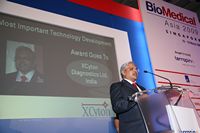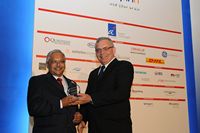Our Vision
XCyton's vision is to become the global leader in Diagnostic Product development and to put India on the world map of Medical diagnostics.
Our Commitment
XCyton creates leaders rather than managers
Our motto at XCyton is to save lives and prevent disabilities thus improving the quality of life of an individual and the nation. We do this through innovations in medical science to meet the unmet medical need.
XCyton is committed to creating an ambient atmosphere in which all employees can work together in a clean and safe environment. They can learn and build career in science.
Team XCyton is committed to provide delight to the customers and others who interact with the company.
Core Values
The core values that are practised in XCyton are
- Integrity
- Excellence
- Responsibility
- Team spirit/unity
Our Mission
- Is to save lives and prevent disabilities.
- To translate our passion for science and availability of cutting edge technology into product that will meet the unmet medical need in patient care.
About XCyton
XCyton, a Molecular Biology Company was founded in 1993 by Dr.B.V. Ravi Kumar, a Physician-Scientist turned technocrat. His vision was to become the global leader in Innovative Diagnostic Product development and to put India on the world map of Medical diagnostics.
XCyton ventured into the development of Molecular Diagnostic products for diagnosis of Critical Care Infections and developed the world's first Critical Care Therapeutic Decision Support System called SYNDROME EVALUATION SYSTEM.
XCyton's SYNDROME EVALUATION SYSTEM (SES) allows for the simultaneous identification multiple organisms like bacteria, Viruses, Fungi and parasites in a single test from a single sample. Hence provides the clinician with a rapid, definitive assessment of a patient who is presenting with a set of symptoms common to multiple pathogens.
XCyton revolutionized Critical Care management through a paradigm shift: from disease-based sequential diagnosis of aetiological agents to a syndrome-based assessment which immediately enables physicians to make critical therapeutic decisions.
In the past XCyton developed immunodiagnostic kits for the detection of Infection. XCyton is credited with the development of the first indigenous ELISA kit for the detection of HIV infection called HIV CheX, following which indigenous ELISA products for the detection of Hepatitis C ( HEP CheX C), Neurocysticercosis (CYSTI CheX) and Japanese encephalitis(JEV CheX) were developed.
XCyton has a young and enthusiastic team of scientists who under the able guidance of Dr. Ravi Kumar can build products from inventions that are in-house, or from academic institutes and other industries, and in the process build strong IPRs.
Accolodates & Awards
| Bio-Singapore Award | "The Most Important Technology Developed in Asia in year 2009" |
| Best Bio-Product Award | Syndrome Evaluation System by Biospectrum for the year 2008 |
| Best Bio-Product Award | JEV-CheX by Biospectrum for the year 2004 |
| Bio-Singapore Award | RABOBANK India Bio Business award for HIV CheX & HEP CheX C |
Singapore Award Winning Images:


Facility
XCyton has it's R&D and Manufacturing facility at Bangalore in Peenya Industrial Area, built in accordance to the stipulations of the Drugs regulatory authority. The infrastructure consists of state of the art facility spread over 12500 square feet and houses the following:
Production Facility:
A Class 10000 facility of 2500 sq ft which is used in the production of Molecular and Immuno Diagnostic products.
R & D Facility:
- BSL-3 facility (area - 1200 sq.ft) for R&D of all Class 3 organisms.
- Tissue culture and monoclonal antibody production Lab.
- Bacteriology Lab.
- Molecular Biology Lab.
- Bio-Informatics area with round the clock high speed Wi-Fi in all areas of the facility.
Molecular Diagnostic Services facility:
- Immunodiagnostics
A 1200 sq ft facility with unidirectional work flow. There are four isolated rooms for performing specific activities. All the laboratories have dedicated equipments and there is no interchange of materials or equipments between different work areas. A number of additional measures and procedures have been included in the assay protocol to minimise further the likely hood of contamination.

